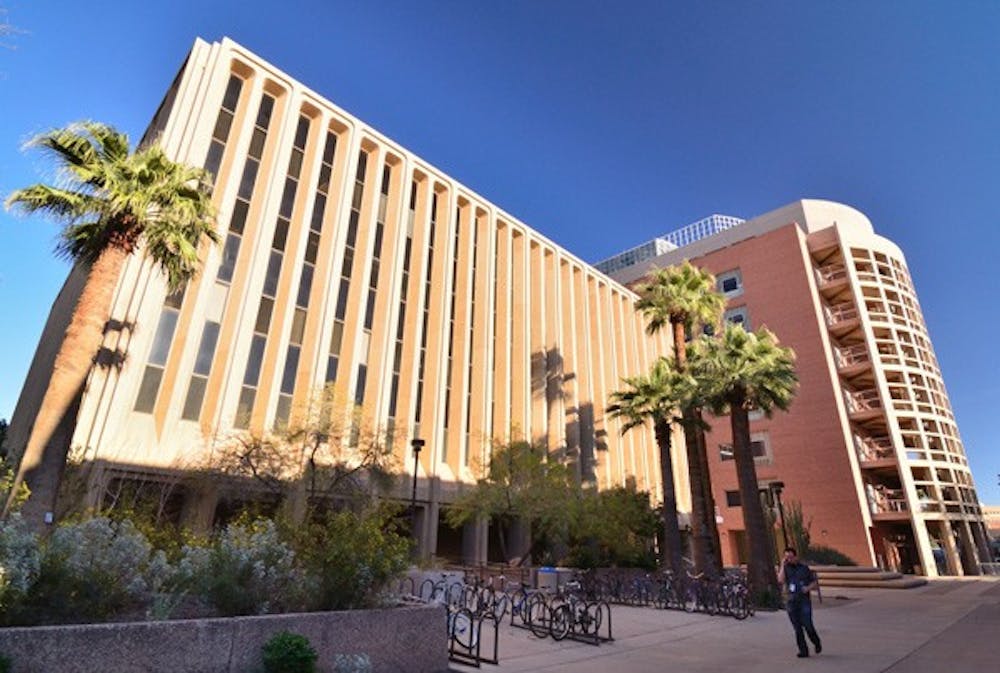Key resources available to natural and life sciences students will be cut next year despite a proposed $800 per-year student fee.
The School of Life Sciences will cut its undergraduate research program, known as SOLUR, as well as the Learning Resource Center, which serves both the life sciences and natural sciences schools.
Two separate fees have been proposed, one for life science students and one for natural science students, but the monetary value is the same and the purposes are nearly identical, said Dean of Natural Sciences Sid Bacon.
The fees, which the Arizona Board of Regents will review Thursday, are designed to help offset the College of Liberal Arts and Sciences’ portion of the $198 million in cuts to state funding to higher education, said Dean of the School of Life Sciences Rob Page.
In response to severe budget cuts in recent years, faculty, staff and classes have already been cut, and the options of where to make cuts are running out, Bacon said.
“We’ve done as much as we feel we can do up to this point. We want to continue to provide the high level of education we’ve been able to provide, but we need resources to do that,” he said. “One of the reasons we’re proposing fees in the natural and life sciences is those programs are more expensive to deliver.”
Laboratory classes in particular can be expensive to deliver because of required equipment and supplies. In addition, most labs require small class sizes, which means more instructors are needed in order to offer an adequate number of sections.
Based on enrollment estimates, the fees will bring in a net revenue of $2.2 million next year, which will be spent on freshman retention and success efforts, improving 300-level courses, creating independent research experiences, and increasing student advising and career services.
At least 17 percent of the fees will also be reinvested in financial aid.
The $2.2 million will allow the schools to recoup slightly less than the amount lost to cuts in state funding.
The $800 amount was selected as the lowest direct cost to students that would maintain the quality of the programs and total revenue. Even if the fees are approved, some cuts will still be required to make ends meet.
Bacon said the money from the fees will be spent in ways that will benefit students as much as possible.
“We want to maintain and enhance the services we offer,” he said. “We don’t want to remain in maintain mode.”
Growth of the programs has contributed to the need to expand services, Bacon said.
“In the last five years, the number of majors in the natural sciences has grown by 68 percent,” he said. “That’s a huge increase, and that puts a lot of pressure on the programs to deliver the curriculum to a greatly increased number of students.”
However, even if the proposed fees are approved, five faculty and 15 teaching assistant positions will be cut, along with some class and lab sections.
“This means it’s going to be more difficult to get into [classes],” Page said. “It’s going to be more difficult to make your normal progress with respect to marching through ASU.”
Page said tuition for natural and life science majors will still remain substantially lower than that of peer institutions.
The use of fees, rather than a larger base tuition increase, ensures the students benefiting from the services provided are the ones paying for them.
“What we’re trying to do with the program fees is have the cost be associated with the people who are using those resources,” Bacon said. “This is targeting those in disciplines where it is more expensive to deliver the education.”
After listening to a presentation on Monday by Page and Bacon about the need for the fees and how they will be implemented, biochemistry sophomore Travis Nez said he feels the fees proposal is fair.
“At first I was against it … knowing tuition is going up and knowing that we have to pay program fees too, but now, … it makes a lot of sense why they are doing it,” he said.
Nez also suggested taking the distribution of the fees a step further and allocating the money by degree program.
“If I [pay] a program fee, it should be specifically for that program,” he said. “Programs fees I’m paying should go strictly to biochem majors and classes, rather than paying for someone else who is a bio major.”
Although he supports the fee, Nez said he is concerned to see the LRC go.
“When you’re taking courses in chemistry, biology and physics … it’s hard to try and grasp everything from even one class alone. With the LRC and the tutors there, you can get a better understanding,” Nez said. “If that’s gone, then it’s like you’re basically on your own. I won’t say it’s going to be impossible to pass a class, but it’s definitely going to be really hard to try to pass a class.”
In regard to the SOLUR program, Page said students will still have many opportunities to gain research experience, but the University will no longer be able to pay them as it has in the past.
“With SOLUR, we were essentially paying students to be interns,” he said. “They were drawing a salary from ASU to do research. Now, it’s going to have to be done on the basis of [class] credit.”
Overall, Nez said he is willing to pay the fee and that students should look at it as an investment in their future.
“It’s part of the value of the degree and how much money we pay for it,” he said. “Students should look at it as a way they are paying for a good, quality education. With the program fee, they’re paying for it to benefit them.”
Reach the reporter at keshoult@asu.edu





